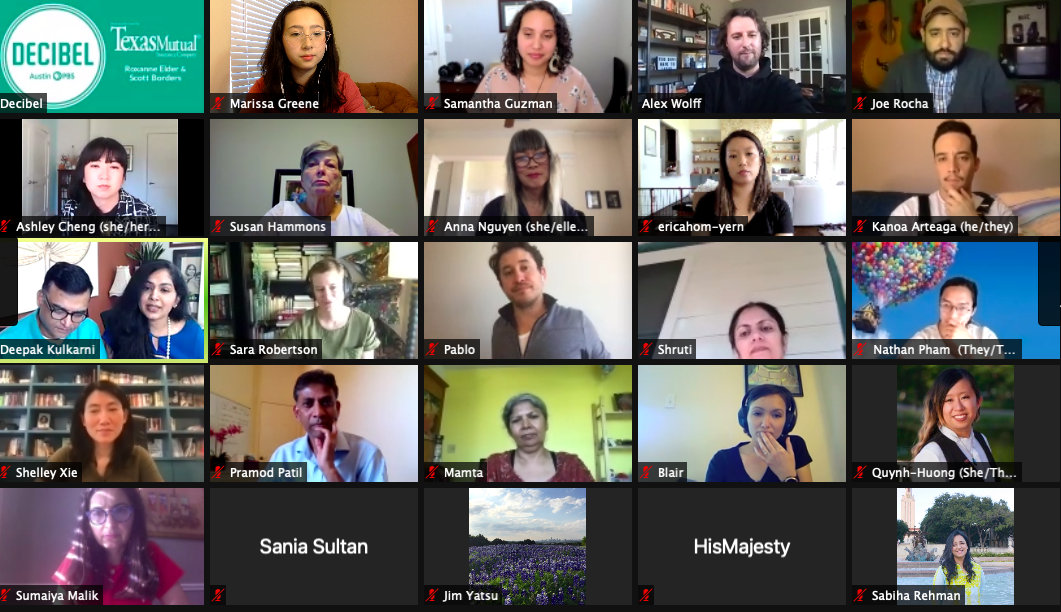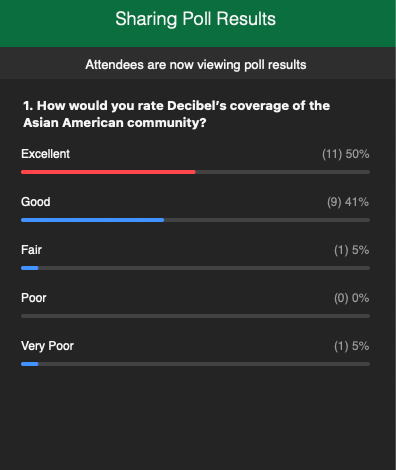
We Hosted A Final Listening Session For Our First Reporting Project
For the past seven months, the Decibel team has been sharing the stories of the Asian American community across Central Texas for our first reporting project. Every step of the way, we’ve been hosting listening sessions in order to not only get story ideas from the community but also hear their feedback on the stories we’ve been producing. To wrap up our first reporting project, we hosted one final listening session with the Asian American community to hear their thoughts about our work and discuss our editorial process.
Since this was our last listening session for this reporting project, we wanted everyone we contacted in these past seven months to be a part of the conversation. We also wanted to reach out to people we haven’t heard from before in order to bring awareness to the work we’ve been doing.
We invited people we’ve met for stories, asked religious facilities such as mosques, temples and churches to share our virtual flyers as well as sharing flyers with Asian-American focused Facebook groups. We wanted as many people as possible to be able to make it to our event so that we could hear a variety of perspectives on our reporting and hear suggestions on how we can improve. On the day of the event we had about 26 people attend, which was one of the largest turnouts we’ve had yet for our virtual listening sessions.
We kicked off our event by screening four stories we’ve done for this reporting project; ‘Becoming the Rouser’, ‘A Year-Round Problem’, ‘Searching for Connection’ and ‘The Power Above’. After each screening, we chatted with interviewees from each story to hear their thoughts on collaborating with Decibel.
During our discussion, we learned that some people had not been interviewed before meeting us. Some of our guest speakers shared how they second-guessed whether they were the right person for the story, while others shared how they didn’t know what to expect since they’ve never been approached by the media before. Some of our guests also shared how their initial feeling was uncertainty.
“Why me?” Quỳnh-Hương Nguyễn said. “What are some of the risks and what are the pros?”
But after getting to know the Decibel team and watching their completed story on Austin PBS, many said their uncertainty transformed into excitement.
“To see the end product so well done, I thought it was fantastic,” Sujata Kulkarni said.
The feedback we received gave us the opportunity to listen for ways we can improve our reporting. A common comment among our guests was how they wished our video stories were longer. By receiving live feedback from our interviewees we are able to be transparent about our editorial process and the decisions we made during this reporting project.
After screening our pieces and interviewing our guests we asked all of our attendees to complete a poll that asked “How would you rate Decibel’s coverage of the Asian American community?” We got some interesting results:

Poll results from our final listening session.
The poll revealed that a majority of our attendees rated Decibel’s coverage excellent or good. We did notice that we had two people vote our coverage fair and very poor. After sharing the poll results with all the attendees, we opened the floor to discuss the results. Unfortunately we did not hear specific feedback from anyone who rated our coverage fair or very poor. One suggestion we received is to try and incorporate a way for attendees to submit their suggestions anonymously, which is something we are considering for future listening sessions.
We used these poll results to drive our final discussion towards hearing what were some things the community wished we did differently. In our chat box we received multiple suggestions for story ideas such as more Pacific Islander, multiracial and refugee representation in our content.
“I would like to see coverage about Austin's Japanese community,” an attendee said.
All of the feedback we received from our guests gave us valuable insight into our first reporting project from the community’s perspective. But most importantly, this event gave us the opportunity to hold ourselves accountable for our mission and ensure that we were being transparent about everything that goes into producing a story. Our goal is for our reporting projects to be a relationship between us and the communities that we cover even as we shift to storytelling in different areas.
The lessons learned from our final listening session with the Asian American community is something that we will carry with us into our next reporting project in Del Valle. Towards the end of our event, guests left with goodbyes and thank you’s to Decibel and Austin PBS.
“Thank you PBS. Thank you Decibel for doing all the pieces. Thank you everyone at Decibel. You did a fantastic job!,” one participant said. “For a long time, our community's voices were always not heard. PBS has documentary series on Asian American history, and then all these pieces. I am really happy to see this.”
No matter where we are reporting our mission of amplifying the diverse voices in Central Texas remains the same. That’s why we are thinking about news ways to continue our partnership with communities we cover like potentially publishing op-eds from community members on our website or developing ways to help community members share their own stories. We are keeping all options open as we move forward so if you have ideas on how we can continue to build trust with communities, have story ideas or just want to chat with someone on our staff, reach out to news@klru.org.
Community journalism doesn’t happen without community support.
Got story ideas, advice on how we can improve our reporting or just want to know more about what we do? Reach out to us at news@klru.org.
And if you value this type of reporting, then please consider making a donation to Austin PBS. Your gift makes the quality journalism done by the Decibel team possible. Thank you for your contribution.
More in Culture:
See all Culture posts





Contact Us
Email us at news@klru.org